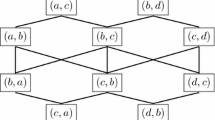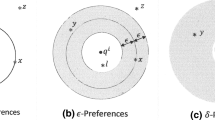Abstract
In a majority rule voting game, the uncovered set is the set of alternatives each of which can defeat every other alternative in the space either directly or indirectly at one remove. Research has suggested that outcomes under most reasonable agenda processes (both sincere and sophisticated) will be confined to the uncovered set. Most research on the uncovered set has been done in the context of voting games with a finite number of alternatives and relatively little is known about the properties of the uncovered set in spatial voting games.
We examine the geometry of the uncovered set in spatial voting games and the geometry of two important subsets of the uncovered set, the Banks set and the Schattschneider set. In particular, we find both general upper and lower limits on the size of the uncovered set, and we give the exact bounds of the uncovered set for situations with three voters. For situations with three voters, we show that the Banks set is identical to the uncovered set.
Similar content being viewed by others
References
Banks, Jeffrey S. ‘Sophisticated Voting Outcomes and Agenda Control’, Social Choice and Welfare (1985).
Cox, Gary W. ‘The Uncovered Set and the Core’, Unpublished manuscript (1985).
Davis, Otto, Morris H. DeGroot, and Melvin Hinich. ‘Social Preference Orderings and Majority Rule’, Econometrica, Vol. 40 (January 1972), 147–157.
Denzau, Arthur T. and Robert J. Mackay. ‘Gatekeeping and Monopoly Power of Committees: An Analysis of Sincere and Sophisticated Behavior’, American Journal of Political Science, Vol. 27 (November 1983), 740–76.
Farquarson, Robin. Theory of Voting. New Haven, Conn: Yale Univ. Press, 1970.
Feld, Scott L. and Bernard Grofman. ‘Necessary and Sufficient Conditions for Majority Winner in n-Dimensional Spatial Voting Games: An Intuitive Approach’, Unpublished manuscript, 1985.
Feld, Scott L., Bernard Grofman, and Nicholas Miller. ‘Cycles Lengths and Other Features of Majority Preference in the Spatial Context’, Paper presented at the Weingart Conference on “Models of Voting”. California Institute of Technology, March 22–23, 1985 (revised version January, 1986).
Ferejohn, John, Morris Fiorina, and Edward W. Packel. ‘Nonequilibrium Solutions for Legislative Systems’, Behavioral Science, Vol. 25 (March 1980), 140–148.
Ferejohn, John A., Richard D. McKelvey and Edward Packel. ‘Limiting Distributions for Continuous State Markov Models’, Social Choice and Welfare, Vol. 1 (1984), 45–67.
Grofman, Bernard and Scott L. Feld. ‘A Neo-Schattschneiderian Model of Agenda Manipulation via Committee Jurisdictional Assignments’, Unpublished manuscript, 1986.
Grofman, Bernard, Guillermo Owen, Nicholas Noviello and Amihai Glazer. ‘Copeland Winner and Stability in Majority Rule Spatial Games’, American Political Science Review (forthcoming).
Hartley, Richard and Marc Kilgour. ‘The Geometry of the Uncovered Set in the Three-voter Spatial Model’, Mathematical Social Sciences, Vol. 14, No. 2 (1987).
Krehbiel, Keith. ‘Obstruction, Germaneness and Representativeness in Legislatures’, Social Science Working Paper 510, California Institute of Technology (January 1984), 1–37.
McKelvey, Richard D. ‘Intransitivities in Multidimensional Voting Models and Some Implications for Agenda Control’, Journal of Economic Theory, Vol. 12 (1976), 472–482.
McKelvey, Richard D. ‘General Conditions for Global Intransitivities in Formal Voting Models’, Econometrica, Vol. 47 (1979), 1085–1111.
McKelvey, Richard D. ‘Covering Dominance and Institution Free Properties of Social Choice’, California Institute of Technology Social Science Working Paper No. 494, September 1983.
McKelvey, Richard D. and Richard G. Niemi. ‘A Multistage Game Representation of Sophisticated Voting for Binary Procedures’, Journal of Economic Theory, Vol. 18 (1978), 1–22.
Miller, Nicholas R. ‘Graph-Theoretical Approaches to the Theory of Voting’, American Journal of Political Science, Vol. 21 (November 1977).
Miller, Nicholas R. ‘A New ‘Solution Set’ for Tournaments and Majority Voting’, American Journal of Political Science, Vol. 24 (1980), 68–96.
Miller, Nicholas R. ‘The Covering Relation in Tournaments: Two Corrections’, American Journal of Political Science, Vol. 27 (1983), 382–385.
Miller, Nicholas, Bernard Grofman and Scott Feld. ‘Cycle Avoiding Trajectories and the Uncovered Set’, Paper presented at the Weingart Conference on Models of Voting, California Institute of Technology, March 22–23, 1985 (revised version, August 1986).
Moulin, Hervé. ‘Choosing from a Tournament’, Unpublished manuscript, 1984.
Packel, Edward W. ‘A Stochastic Solution Concept for n-Person Games’, Mathematics of Operations Research, Vol. 6, No. 3 (August 1981), 349–362.
Plott, Charles R. ‘A Notion of Equilibrium and Its Possibility under Majority Rule’, American Economics Review, Vol. 57 (1967), 787–806.
Riker, William. Liberalism against Populism: A Confrontation Between the Theory of Democracy and the Theory of Social Choice, San Francisco: W. H. Freeman, 1982.
Schofield, Norman. ‘Instability of Simple Dynamic Games’, Review of Economic Studies, Vol. 45 (1978), 575–594.
Shepsle, Kenneth A. ‘The Role of Institutional Structure in the Creation of Policy Equilibrium’, in Douglas W. Rae and Theodore J. Rismeir (eds.), Public Policy and Public Choice, Vol. VI. Beverly Hills: Sage, 1979, 96–111.
Shepsle, Kenneth A. and Barry R. Weingast, ‘Uncovered Sets and Sophisticated Voting Outcomes with Implications for Agenda Institutions’, American Journal of Political Science, Vol. 28, (February 1984), 49–74.
Wuffle, A., Scott Feld, Guillermo Owen and Bernard Grofman. ‘Finagle's Law and the Finagle Point: A New Solution Concept for Two-Candidate Competition in Spatial Voting Games Without a Core’, American Journal of Political Science (forthcoming).
Author information
Authors and Affiliations
Consortia
Rights and permissions
About this article
Cite this article
Feld, S.L., Grofman, B., Hartly, R. et al. The uncovered set in spatial voting games. Theor Decis 23, 129–155 (1987). https://doi.org/10.1007/BF00126302
Issue Date:
DOI: https://doi.org/10.1007/BF00126302




